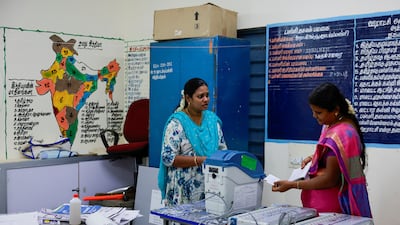As India’s general election gets under way, campaign strategists are busy managing every move of their political parties and candidates as they work to woo voters.
Nowhere is this more evident than in the two-storey bungalow in New Delhi known as the "Central War Room", which has become the nerve centre for the main opposition party, the Indian National Congress.
Congress, which leads the multiparty INDIA alliance, is taking on Prime Minister Narendra Modi and his Bharatiya Janata Party, which leads the National Democratic Alliance.
The contest for the votes of nearly 970 million people will last for six weeks, until June 1, with the count taking place on June 4.
In the Central War Room, about 100 professionals led by the former civil servant Sasikanth Senthil work day and night to stop Mr Modi from winning a third consecutive term.
They receive feedback and data from 45 state-level units, as well as candidates and party workers, two people associated with the campaign said.
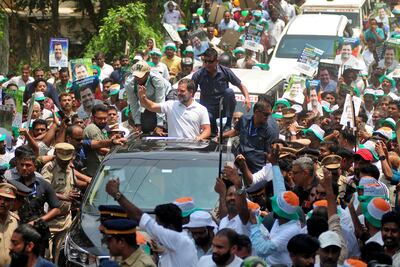
The party's in-house poll strategist Sunil Kanugolu, who is credited for Congress wins in Karnataka and Telangana states, gives input and strategic suggestions directly to the party leadership after conducting field surveys and research with his team.
With the input from Mr Kanugolu's team and Central War Room, the Congress party’s senior leadership makes its major decisions, from campaign themes and the manifesto, to how to manage resources and select candidates. The party has other war rooms for publicity and social media.
"Unlike the BJP, which deploys many agencies to get feedback, we get most of our information and data from our state units and party leaders," said Gokul Butail, vice chairman of the Central War Room.
"Through our state-level war rooms, we are suggesting ways to make unemployment and price rises key issues, activate party workers and manage biased media."
The party has identified about 250 target seats where it believes it can challenge the BJP, and is focusing on those, said Mr Butail, who predicted a surprise. "Wait until the counting day, you will get a surprise result," he added.
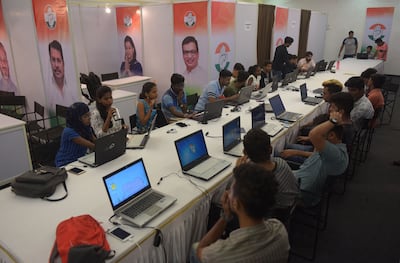
BJP's data-driven campaign
In contrast, the ruling BJP does not have a formal central war room. Instead, it uses a variety of methods, including political consulting firms, to gather data and calibrate its campaign.
At the BJP's old office in Ashok Road in central Delhi, more than 100 professionals are engaged in collecting and analysing data on voters, candidates, constituencies and various welfare programmes.
Political consultancy firms including Varahe Analytics and Association of Billion Minds have used thousands of employees to collect data, conduct surveys and give recommendations to the BJP leadership, sources said.
The firms have provided information on governance feedback, ground intelligence and data-backed insights, the sources said.
Jarvis Technology & Strategy Consulting is also providing technological support, conducting data mapping and managing call centres for the BJP with its 300 full-time workers and thousands of paid associates.
Through 360 call centres, Jarvis is reaching out to as many as six million BJP workers every day, a Jarvis official said.
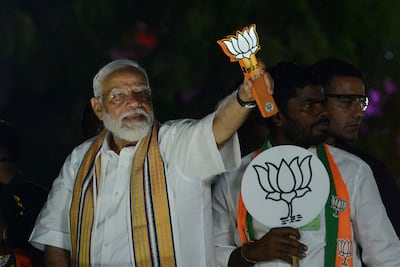
The BJP has a database of 210 million party workers and supporters collected during various programmes and "missed call" campaigns.
Jarvis staff and BJP workers are also establishing connections with as many as 260 million voters, mostly beneficiaries of government welfare programmes, a Jarvis official said.
The data of party supporters and voters, along with feedback gathered through call centres, is being stored in an app called Saral and analysed in real-time.
The BJP’s central leadership, including Mr Modi, Home Minister Amit Shah and the party President JP Nadda, receive daily reports, on which they take strategic campaign decisions. Mr Shah has his own team to receive feedback, sources said.
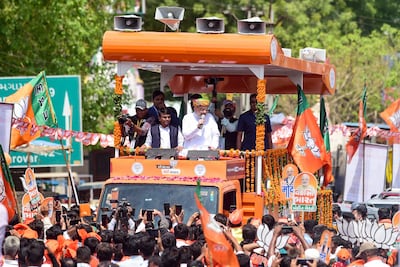
Rise of the consultants
The political consulting industry in India is growing as parties and candidates seek the help of poll specialists to navigate the evolving political landscape and complex elections.
Many of these consulting firms are run by former students of India’s top Institutes of Technology and Management. Many of the consultants do not have political backgrounds, but say they understand the dynamics of politics and the instincts of voters well.
The role of poll strategists and political aides has grown since the 2014 elections, which Mr Modi won after an innovative digital campaign.
The poster boy of the industry is Prashant Kishore, a sought-after political strategist who is credited with helping Mr Modi to victory in 2014. He also worked with Congress and other regional parties to win state elections through his Indian Political Action Committee, or I-PAC.
Several members of I-PAC have since branched out and set up their own firms.
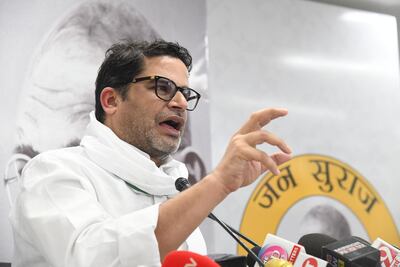
The industry is still evolving rapidly. Experts say there are about 150 political consultancies in India of different sizes. Their charges range from 100,000 rupees ($1,200) to as much as 10 million rupees, depending on their services.
Many smaller parties and individual candidates also use tech-savvy professionals to support their campaigns.
Animesh Pandey, who cofounded the political consultancy firm P-Marq, said his team had been assisting a national party on voter concerns and priorities. He did not specify which party, for strategic reasons.
Another political consultant, Amit Singh, said he had advised another party that caste-based voting will have less relevance this time, using analysis of voting patterns and data from ground.
Separately, many candidates have also engaged agencies for specific tasks such as managing social media campaigns.
"We closely work with the candidates to provide unbiased information and good strategy to win elections," said Dhawal Vasavada, director of PoliticalEDGE, which provides full-service election management to individual candidates from conducting research of constituencies to strengthening connections with voters.
"It’s a very nascent industry – about 15 years. Based on the size of the industry, the demand is good."
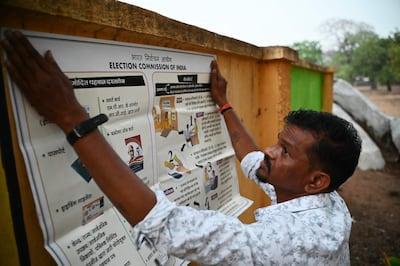
Professionals are also helping candidates to overhaul their brands. Amaresh Rai is a political coach, who gives formulas to individual candidates on how to win elections, focusing on attitude, speech and dress.
Alongside political consulting firms, coaching centres and institutions like School of Politics and Indian School of Democracy are also growing.
"We have training and mentorship programmes where we handhold people, create strategy for them to ensure they contest and win elections," said Abhimanyu Bharti, founder of the School of Politics. "The focus is how to understand the pulse of voters."
Two former students of the institution are contesting the elections, he said.
Despite the booming political consultancy industry, some have warned that they can only make a limited effect, with elections won and lost due to a range of factors.
Amitabh Tiwari, a political analyst with experience in consulting, said the key value of political strategists was their ability to give blunt feedback that political leaders may not otherwise receive.
However, he warned against exaggerating the impact of fellow consultants. "Good marketing can't sell a bad product," he said.
